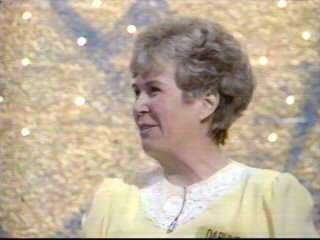Going for Gold
m (→Trivia) |
m (→Broadcast) |
||
| Line 8: | Line 8: | ||
Reg Grundy for BBC1 and (NBC) Super Channel, 12 October 1987 to 9 July 1996 (703 programmes) | Reg Grundy for BBC1 and (NBC) Super Channel, 12 October 1987 to 9 July 1996 (703 programmes) | ||
| - | Co-produced by BBC North West, | + | Co-produced by BBC North West, 1989-1996 |
</div> | </div> | ||
Revision as of 11:06, 9 May 2007
Contents |
Host
Broadcast
Reg Grundy for BBC1 and (NBC) Super Channel, 12 October 1987 to 9 July 1996 (703 programmes)
Co-produced by BBC North West, 1989-1996
Synopsis
This "Euroquiz" was both a blessing and a curse. A blessing because its production values were at least twice that of any similar show in a BBC daytime quiz slot. A curse because it hung around for far more series than it really deserved, varying the format with precisely no innovations during its long run and preventing any new shows coming to air.
Contestants from the various parts of Europe - well, those that spoke English, anyway - flew to Elstree (or, in later series, Manchester) to appear on a show produced by Australian-owned Reg Grundy to be asked questions by Irishman for a holiday in somewhere like Seoul. Now you may have already spotted the significant home advantage in being asked a question in a familiar studio, in your mother tongue by someone with a not very straightforward accent. To ramp up the likelihood of a home winner, England, Ireland, Scotland and Wales were treated as entirely separate countries, as were the various islands around the UK!
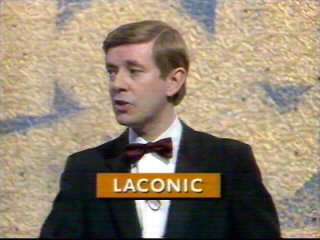 Host, Henry Kelly
Host, Henry KellyThe programme followed the now-familiar but then revolutionary repechage-style format where contestants stayed with the show for the whole week. Seven contestants would appear on Monday, and from those four answered elimination questions correctly to go into what Henry Kelly would constantly refer to as "the first round proper". The three rejects that didn't get used today, together with the three that would be knocked-out during Monday's contest, would come back on Tuesday, and so on.
In the "proper" round 1, the four qualifying contestants were asked a so-easy-it-hurts General Knowledge starter for one point. The contestant that answered the question correctly would then be told by Henry Kelly "The next category is... Cheese. Select." which was their cue to choose between a 1, 2 or 3 point question. The first three contestants to reach six points would go onto the next round, with the losing contestant going back into the selection pool for the next show.
"Four in a Row" was a very straight-forward game where each of three contestants would pick one of four categories and answer as many questions as they could in 40 seconds. The only real sting was that getting one answer wrong meant your score reset to zero. The categories were often slightly bizarre, such as "Sports that use balls", "Italian cities", "Vietnamese cuisine" and "Transport beginning with S". The highest scoring contestants would go through into the final.
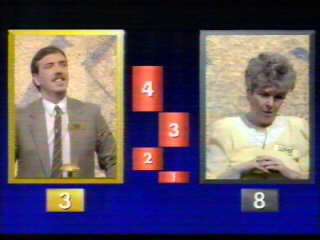 The final in progress
The final in progressIt must be said, the end game was very clever. Kelly would read out a long description of a famous person, place or object (always beginning with "What am I?" or "Who am I?") that revealed more and more information as the time went on. However, the number of points available reduced from 4 down to just 1, so the quicker you could buzz in, the more points you got.
The other tactic was that you could play or pass control of the subject. Playing meant that you got the 2 point zone and the (catchphrase) "big 4 point zone", and you could only buzz in when the clock was in these zones, your opponent getting control during the 1 and 3 point zones. The situation was reversed if you passed on a subject. The person that was "playing catch-up" as Kelly put it (or "behind", as any normal person would say) would decide whether to play or pass. Answering a question wrongly meant that one of your "time zones" got passed over to your opponent, thus preventing multiple guesses in the same zone. It was nine points or more for a win.
Winning a show meant you appeared in the final at the end of the week. Winning the weekly final meant going through to some semi-finals, which eventually went on to a grand final (at which point Kelly would whip out his dinner jacket).
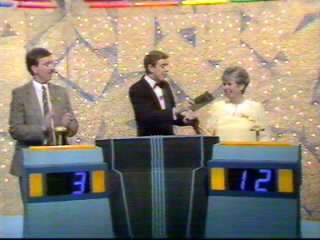 A dinner jacketed Henry Kelly awards the eventual winner of Going for Gold with some tickets to the Olympic Games
A dinner jacketed Henry Kelly awards the eventual winner of Going for Gold with some tickets to the Olympic GamesThe series winner would almost always get a holiday to somewhere far away Australia, New Zealand, the USA or - on one occasion - the Olympic Games. A short film ramming the point home would appear in the break between rounds 1 and 2. As there were only five promo films, we got to learn these off by heart pretty quickly.
Key moments
The contestants would wave, smile or grimace interestingly in the show's opening sequence. There was always one..
Catchphrases
"And now on to the first round proper."
"You're playing catch-up"
"Lady and gentleman, will you please follow me - and (to the viewers) why don't you come too?"
"Incorrect - out of the rest of the question!"
(In the 'Four-In-A-Row' Round): "You have chosen (whatever subject), and on that subject, your time starts....now!"
(In the final round): "Time passes to you, and continues....now!"
Inventor
Devised by the Reg Grundy organisation, and now licensed by Freemantle Media. In particular, it inspired the French show Questions pour un Champion, which launched across the Channel in 1988 and remains a huge success. Apparently, the prime time special is more popular than blockbuster films or international football matches.
Trivia
In 1987, NBC produced a non-broadcast American pilot of the show called Run for The Money, hosted by comedian Bill Rafferty. It didn't pass the pilot stage although interestingly, it was recorded at Elstree Studios! NBC would later become involved with GFG again when it brought Super Channel, the pan-European broadcaster which shown GFG across the continent.
Theme music
Composed by Hans Zimmer (who went on to compose the music to the successful movie Gladiator) and Sandy McClelland.
The celebratedly-bad Euro soft rock tune went as follows:
Going for gold! The heat is on, the time is right, It's time for you, for you to play your game. 'Cause people are coming, everyone's trying, Trying to be the best that they can, When they're going for... going for... Gold.
But that's not all! We bet you never knew there was another verse, but there was. As far as we know, it was only heard once, during a clips compilation in the grand final of series 2 (which, incidentally, was the first time anyone knew the theme even had lyrics, as only an instrumental version had been used on the show until then). And here's the lyrics for the long version (note extra bridge section too!).
Going for gold! The heat is on, the time is right, It's time for you, for you to play your game. 'Cause people are coming, everyone's trying, Trying to be the best that they can, To reach for the sky 'cause the stakes are so high, When they're going for, going for gold!
Go for it - for gold! Go for it - only the best survive Go for it - for gold! Go for it and you can take your prize Go-ing for... Gold!
Making a way in the world, It's hard and easy. Trying to get where we wanna be, That's the toughest thing of all. All we need is a little more getting-it-right, All we need is a little more stay-in-the-fight, Learning more and more, what we're striving for, When we're going for gold.
<Instrumental>
So the heat is on and the time is right, It's time for you, for you to play your game. 'Cause people are coming, everyone's trying, Trying to be the best that they can, To reach for the sky where the stakes are so high, We're all going for, going for gold!
Go for it - for gold! Go for it - only the best survive, Go for it - for gold! Go for it and you can take your prize, Go for it - for gold! Go for it - only the best survive!
Winners
Series champions:
- 1987-88 - Daphne Fowler (England) (appeared under the name Daphne Hudson)
- 1988-89 - Erik Matteson (Norway)
- 1989-90 - Howard Atkinson (England)
- 1990-91 - Luc Sucholtz (Belgium)
- 1991-92 - Soren Bergman (Denmark)
- 1992 - Christine Coslett (Wales)
- 1993 - Not known (Belgium)
- 1994 - Mieke Poelman (The Netherlands)
- 1995 - Sven Goll (Norway)
- 1996 - Mike Ramsden (Kent)
The first five series aired during the winter, split in half by the Christmas break. The second 1992 and 1993 series went out in the autumn, the last three aired during the summer. The 1996 series featured competitors from the UK only.
Web links
See also
One to Win - Channel 5 remake
Pictures
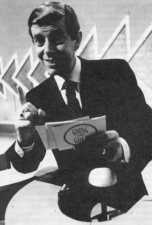 Picture 1 - Host Henry Kelly, on the set of Going for Gold.
Picture 1 - Host Henry Kelly, on the set of Going for Gold.
